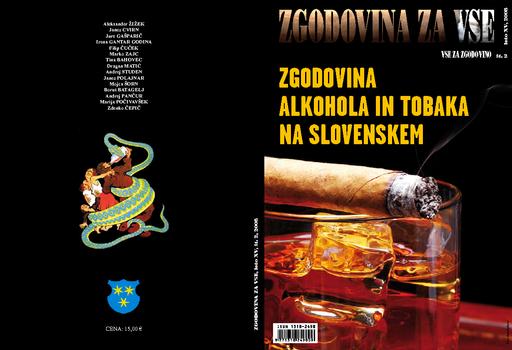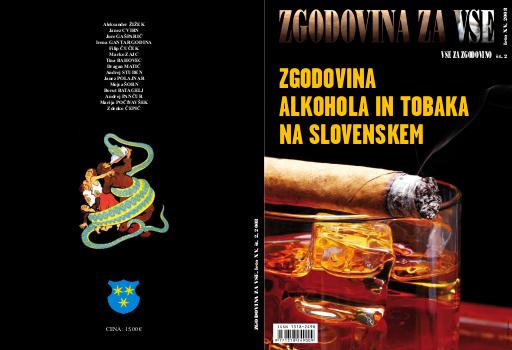
/
Serijske publikacije
/
Zgodovina za vse
»Tudi če so trezni, niso angeli, pijani pa so zverine«
Problem alkoholizma in recepcija teorije progresivne degeneracije na Slovenskem konec 19. in na začetku 20. stoletja

Avtor(ji):Andrej Studen
Soavtor(ji):Andrej Studen (ur.)
Leto:2008
Založnik(i):Zgodovinsko društvo, Celje
Jezik(i):slovenščina
Vrst(e) gradiva:besedilo
Ključne besede:alkoholizem, degeneracija, medicina, psihiatrija, Ivan Robida, Fran Goestl, alcoholism, degeneration, medicine, psychiatry, Ivan Robida, Fran Goestl
Avtorske pravice:

To delo avtorja Andrej Studen je ponujeno pod Creative Commons Priznanje avtorstva-Nekomercialno-Brez predelav 4.0 Mednarodna
Datoteke (1)

Ime:2008_2_Zgodovina za vse.pdf
Velikost:10.25MB
Format:application/pdf
Stalna povezava:https://hdl.handle.net/11686/file711
Opis
Avtor v članku predstavi proces naraščanja alkoholizma v
19. in 20. stoletju. Alkohol je v dobi meščanstva postal droga,
ki se je širila med ljudstvom, zastrašujoč pa je bil zlasti pohod
»strupenega« žganja. Alkoholizem kot socialna bolezen je ogrožal
tako telesno in duševno zdravje posameznika kot celega
naroda. Pijanci naj bi z vdajanjem alkoholu uničevali zlasti
možgane, s pitjem pa naj bi ogrožali tudi potomstvo, bodoči
rod naj bi bil še slabši, še bolj letargičen, malodušen in degeneriran.
Škodljivost alkohola je v 30. letih 19. stoletja skrbela
že zdravnika Frana Viljema Lipiča, v drugi polovici 19. stoletja
pa je vse več privržencev dobivala Morelova teorija progresivne
degeneracije. Med avstrijskimi psihiatri jo je populariziral zlasti
profesor Richard von Krafft-Ebing, v svojih spisih o alkoholizmu
in blaznosti pa sta jo razširjala tudi psihiatra Ivan Robida in
Fran Goestl. Kronični alkoholizem naj bi imel v težjih primerih
za posledico moralno degeneracijo in alkoholno sprevrženost,
skratka, najbolj žalostna posledica alkoholizma naj bi bila etična
in nravstvena degeneracija pijancev, ki se razvija ob propadanju
razuma in srca. Alkoholizem naj bi bil poguben zlasti za potomce,
ki so jih imeli za še bolj degenerirane in psihično manjvredne.
Starši alkoholiki naj bi imeli običajno otroke alkoholike,
skratka, iz zla naj bi se rodilo zlo. Na prelomu 19. in 20. stoletja
je alkoholizem dokončno postal bolezen, njegove kvarne učinke
pa so iskali v jedru socialne reprodukcije in družinskem življenju.
Tipičen alkoholik – degeneriranec naj bi torej imel znamenje
duševne degeneracije vtisnjeno že v kali, bil pa naj bi tudi
sokriv zastrupljanja in rastočega slabšanja prihodnjih rodov.
Metapodatki (12)
- identifikatorhttps://hdl.handle.net/11686/1796
- naslov
- »Tudi če so trezni, niso angeli, pijani pa so zverine«
- Problem alkoholizma in recepcija teorije progresivne degeneracije na Slovenskem konec 19. in na začetku 20. stoletja
- “They are no angels even when sober, but turn into beasts when they are drunk ”
- The Problem of Alcoholism and the Reception of the Theory of Progressive Degeneration in Slovenia at the End of the 19th and the Beginning of the 20th century
- „Auch wenn sie nüchtern sind, sind sie keine Engel, betrunken aber sind sie Bestien!“ Das Problem des Alkoholismus und die Rezeption der Theorie der progressiven Degeneration im slowenischen
- Gebiet Ende des 19. und zu Beginn des 20. Jahrhunderts
- avtor
- Andrej Studen
- soavtor
- Andrej Studen (ur.)
- predmet
- alkoholizem
- degeneracija
- medicina
- psihiatrija
- Ivan Robida
- Fran Goestl
- alcoholism
- degeneration
- medicine
- psychiatry
- Ivan Robida
- Fran Goestl
- opis
- The author presents the process of the rise of alcoholism in the 19th and 20th centuries. In the era of citizenry, alcohol became a drug that spread among the people, and it was in particular the march of the “poisonous” spirits that took frightening proportions. Alcoholism as a social disease threatened both the corporal and mental health of individuals and the entire nation. With excessive drinking, the drunkards particularly destroyed their brains, and their drinking also posed a threat to their progeny; their offspring apparently would become even worse, even more lethargic, low-spirited and degenerate. Doctor Fran Viljem Lipič was already concerned about the noxiousness of alcohol in the 1830s, while in the second half of the 19th century, it was Morel’s theory of progressive degeneration that gained more and more followers. Professor Richard von Krafft-Ebing made it particularly popular among Austrian psychiatrists, and the theory was also advocated in the essays on alcoholism and insanity by the psychiatrists Ivan Robida and Fran Goestl. In the more serious cases, chronic alcoholism was believed to lead to moral degeneration and alcohol depravity. Thus, the saddest consequence of alcoholism was an ethical and moral degeneration of the drunkards, which developed alongside the decay of the mind and the heart. Alcoholism was believed to be particularly pernicious to the offspring, who were considered even more degenerate and psychically inferior. It was believed that parents who were alcoholics would also have alcoholic children; i.e. evil led to more evil. At the end of the 19th and the beginning of the 20th century, alcoholism finally became a disease, and its ill effects were sought at the core of social reproduction and family life. A typical alcoholic-degenerate was thus believed to be imprinted with mental degeneration from the outset, and was also partly responsible for the poisoning and increased weakening of future generations.
- Avtor v članku predstavi proces naraščanja alkoholizma v 19. in 20. stoletju. Alkohol je v dobi meščanstva postal droga, ki se je širila med ljudstvom, zastrašujoč pa je bil zlasti pohod »strupenega« žganja. Alkoholizem kot socialna bolezen je ogrožal tako telesno in duševno zdravje posameznika kot celega naroda. Pijanci naj bi z vdajanjem alkoholu uničevali zlasti možgane, s pitjem pa naj bi ogrožali tudi potomstvo, bodoči rod naj bi bil še slabši, še bolj letargičen, malodušen in degeneriran. Škodljivost alkohola je v 30. letih 19. stoletja skrbela že zdravnika Frana Viljema Lipiča, v drugi polovici 19. stoletja pa je vse več privržencev dobivala Morelova teorija progresivne degeneracije. Med avstrijskimi psihiatri jo je populariziral zlasti profesor Richard von Krafft-Ebing, v svojih spisih o alkoholizmu in blaznosti pa sta jo razširjala tudi psihiatra Ivan Robida in Fran Goestl. Kronični alkoholizem naj bi imel v težjih primerih za posledico moralno degeneracijo in alkoholno sprevrženost, skratka, najbolj žalostna posledica alkoholizma naj bi bila etična in nravstvena degeneracija pijancev, ki se razvija ob propadanju razuma in srca. Alkoholizem naj bi bil poguben zlasti za potomce, ki so jih imeli za še bolj degenerirane in psihično manjvredne. Starši alkoholiki naj bi imeli običajno otroke alkoholike, skratka, iz zla naj bi se rodilo zlo. Na prelomu 19. in 20. stoletja je alkoholizem dokončno postal bolezen, njegove kvarne učinke pa so iskali v jedru socialne reprodukcije in družinskem življenju. Tipičen alkoholik – degeneriranec naj bi torej imel znamenje duševne degeneracije vtisnjeno že v kali, bil pa naj bi tudi sokriv zastrupljanja in rastočega slabšanja prihodnjih rodov.
- Der Beitrag schildert das Anwachsen des Alkoholismus im 19. und 20. Jahrhundert. Alkohol wurde in der Zeit des Bürgertums zum Suchtmittel, das sich unter der Bevölkerung verbreitete, wobei insbesondere der Vormarsch des „giftigen“ Branntweins beängstigend war. Der Alkoholismus als soziale Krankheit gefährdete sowohl die körperliche als auch die geistige Gesundheit des Einzelnen und des gesamten Volkes. Säufer schädigten angeblich durch ihren Alkoholkonsum insbesondere das Hirn, bedrohten aber auch die Nachkommenschaft, denn die folgende Generation werde noch schlechter, lethargischer, kleinmütiger und degenerierter. Die Schädlichkeit von Alkohol machte in den dreißiger Jahren des 19. Jahrhunderts schon dem Arzt Franz Wilhelm Lippich Sorgen. In der zweiten Hälfte des 19. Jahrhunderts fand dann Morels Theorie der progressiven Degeneration immer mehr Anhänger. Unter den österreichischen Psychiatern wurde sie vor allem von Professor Richard von Krafft-Ebing popularisiert. Auch die Psychiater Ivan Robida und Fran Goestl beriefen sich in ihren Schriften über Alkoholismus und Wahnsinn auf diese Theorie. Chronischer Alkoholismus führte vermeintlich in schweren Fällen zur moralischen Degeneration und alkoholischen Entartung, kurzum, als die traurigste Folge des Alkoholismus galt die ethische und moralische Degeneration der Säufer, die mit dem Verfall von Verstand und Herz einherging. Die Trinkerei schadete insbesondere der Nachkommenschaft, die als noch stärker degeneriert und psychisch minderwertig angesehen wurde. Eltern, die Alkoholiker waren, hatten angeblich meist Kinder Alkoholiker, denn Übel führe zu weiterem Übel. An der Wende vom 19. zum 20. Jahrhundert wurde Alkoholismus endgültig als Krankheit aufgefasst und seine negativen Auswirkungen im Kern der sozialen Reproduktion und im Familienleben gesehen. Ein typischer Alkoholiker als Degenerierter hatte das Mal der geistigen Degeneration vermeintlich schon im Keim eingeprägt und galt als mitschuldig an der Vergiftung und dem zunehmenden Niedergang der kommenden Generationen.
- založnik
- Zgodovinsko društvo
- datum
- 2008
- tip
- besedilo
- jezik
- Slovenščina
- jeDelOd
- pravice
- licenca: ccByNcNd
Seznam literature v delu (33)
| Stran | Avtor | Naslov | Vir | Kraj | Založba | Leto |
|---|---|---|---|---|---|---|
| 106 | Dr., Ahasverus | Nekaj o naših socijalnih in ojkonomijskih zadevah | Leposloven in znanstven list | Celovec | Kres | |
| 91 | Becker, Peter | Verderbnis und Entartung: eine Geschichte der Kriminologie des 19. Jahrhunderts als Diskurs und Praxis | Göttingen | 2002 | ||
| 104 | Cvirn, Janez | Boj za sveti zakon: prizadevanja za reformo poročnega prava od 18. stoletja do druge svetovne vojne | Ljubljana | 2005 | ||
| 105 | Dolenc, Metod | Alkohol in kriminaliteta | Prerod | 1922 | ||
| 99 | Goestl, Fran | Pijanost in blaznost | Letopis Matice Slovenske za leto 1893 | |||
| 106 | Hlubek Franz, Xaver | Der Verkehr zwischen Triest und der Monarchie, und die Wien-Triester Eisenbahn | Wien | |||
| 106 | Bonaventura Anton, Jeglič | Ženinom in nevestam | Ljubljana | 1910 | ||
| 106 | Kalan, Janez | Kaj je torej z alkoholom? | Postojna | 1906 | ||
| 91 | Kaschuba, Wolfgang | Lebenswelt und Kultur der unterbürgerlichen Schichten im 19. und 20. Jahrhundert | München | 1990 | ||
| 97 | Richard von, Krafft-Ebing | Über gesunde und kranke Nerven | Tübingen | |||
| 91 | Lipič Fran, Viljem | Osnovne značilnosti dipsobiostatike - zlorabe alkohola oziroma na podlagi zdravniškega opazovanja nastala politično-statistična predstavitev njenih posledic, ki se odražajo na prebivalstvu in življenjski dobi | Ljubljana | 2005 | ||
| 91 | Lippich Franz, Wilhelm | Grundziüge zur Dipsobiostatik oder politisch-arithmetische auf ärtzliche Beobachtung gegrundete Darstellung der Nachtheile, welche durch den Missbrauch der geistigen Getränke in Hinsicht auf Bevölkerung und Lebensdauer sich ergeben | Laibach | |||
| 104 | Mrkun, Anton | Zgodovina protialkoholnega gibanja po vsem svetu, zlasti v Sloveniji 1902-1927 | Ljubljana | 1927 | ||
| 95 | Müller, Friedrich | Der Branntwein | Culturbilder aus Steiermark | Graz | ||
| 105 | Pilcz, Alexander | Ozdravljivost alkoholikov | Piščalka | 1906 | ||
| 96 | Pirc, Ivo | Zdravje v Sloveniji. II. knjiga, | Zdravstvene prilike in delo higijenskih ustanov v Sloveniji 1922-1936 | Ljubljana | 1938 | |
| 107 | Prijatelj, Anton | Dr. Fran Goestl - psihiater in publicist | Primorska srečanja | 1994 | ||
| 91 | Robida, Ivan | Alkohol und Irresein | Sonderabdruck aus der Laibacher Zeitung | Laibach | ||
| 101 | Robida, Ivan | Alkoholizem | Ljubljanski zvon | 1901 | ||
| 95 | Robida, Ivan | Poročilo o alkoholizmu na Kranjskem | Piščalka | 1906 | ||
| 102 | Robida, Ivan | Psihične motnje na alkoholski podlagi s posebnim ozirom na forum | Ljubljana | 1921 | ||
| 94 | Samec, Maks | Vpliv vpijanljivih pijač na posamezni človeški organizem in na človeško društvo v obče | Ljubljana | |||
| 91 | Sandgruber, Roman | Die Anfänge der Konsumgesellschaft: Konsumguterverbrauch, Lebensstandard und Alltagskultur in Österreich im 18. und 19. Jahrhundert | München | 1982 | ||
| 91 | Sandgruber, Roman | Bittersüsse Genusse | Kulturgeschichte der Genußlmittel | Wien - Köln - Graz | 1986 | |
| 96 | Shorter, Edward | A History of Psychiatry: from the Era of the Asylum to the Age of Prozac | New York | 1997 | ||
| 93 | Studen, Andrej | Slovenci, problem alkoholizma in katoliška morala pred prvo svetovno vojno | Glasnik Slovenskega etnološkega društva | 2006 | ||
| 107 | Studen, Andrej | Tudi Christoph Mlilhelm Hufeland je bil Lipičev vzornik, Zgodovinski časopis, Ljubljana, 61, 2007, št. 3-4, str. 501-507. | ZČ | Ljubljana | 2007 | |
| 93 | Studen, Andrej | Tudi Christoph Mlilhelm Hufeland je bil Lipičev vzornik | ZČ | Ljubljana | 2007 | |
| 93 | Studen, Andrej | »Ne pij več in bodi srečen!« Poročila dunajskega Gesundheits-Zeitung o protialkoholnem gibanju v Ameriki in Evropi v 30-ih letih 19. stoletja | Časopis za zgodovino in narodopisje | 2007 | ||
| 105 | Šepetavc, Anton | Pijem, torej sem Slovenec ali alkohol(izem) kot tabu in fenomen slovenstva | Zgodovina za vse | 1995 | ||
| 107 | Šerko, Edvard | Beseda našemu izobraženstvu, Piščalka | 1906 | |||
| 93 | Wolf, Julia | Aufdem Weg zu einer Ethik der Sucht: Neurowissenschaftliche Theorien zur Sucht und deren ethische Implikationen am Beispiel der Alkohol- und Heroinsucht | Stuttgart | Dissertation | 2003 | |
| 103 | Wulffen, Erich | Der Sexualverbrecher | Encyklopädie der modernen Kriminalistik, Bd. VII. | Berlin-Gross-Lichterfelde | 1910 |